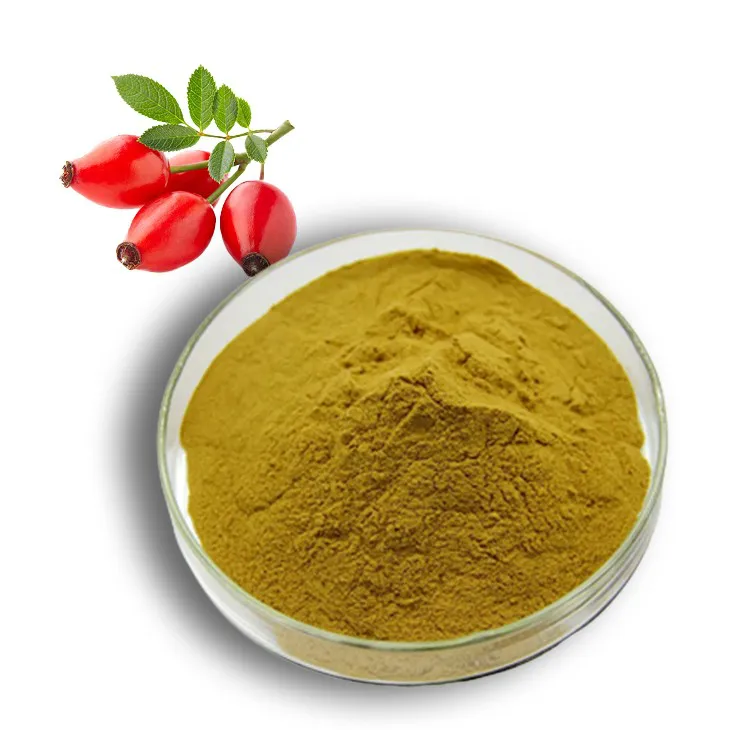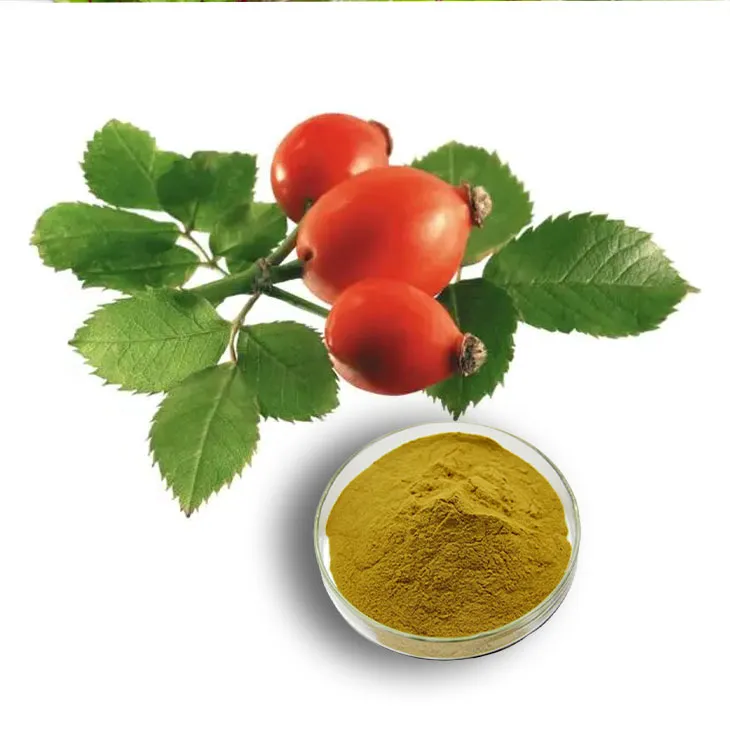- 0086-571-85302990
- sales@greenskybio.com
Rose Hip Extract: Uses, Advantages, and Manufacturing Processes
2024-11-13

I. Introduction
Rosehip extract has emerged as a valuable natural resource in various industries. Derived from the fruit of the rose plant, it offers a wide range of potential benefits. This article will explore its uses, advantages, and the manufacturing processes involved.

II. Uses of Rose Hip Extract
A. Dietary Supplements
Rosehip extract has found a significant place in the dietary supplement industry. It is commonly available in the form of capsules or powders. People consume these products with the aim of boosting their overall health. The reason behind this lies in its rich nutrient composition. It is thought to enhance the body's resistance to diseases. For example, it contains vitamins such as vitamin C, which is well - known for its role in immune function. Additionally, it may also have other nutrients and bioactive compounds that work together to support the body's well - being.
B. Haircare Products
Another area where rosehip extract is used is in haircare products. It has properties that can benefit the hair in multiple ways. It is capable of nourishing the hair follicles. By doing so, it helps in making the hair stronger and shinier. This is particularly appealing to those who are looking for natural ingredients to improve the health and appearance of their hair.

III. Advantages of Rose Hip Extract
A. Sustainability
One of the major advantages of rosehip extract is its sustainability. Rosehips are a renewable source. This makes it an attractive option for environmentally - conscious consumers. As the demand for natural and sustainable products continues to grow, rosehip extract stands out as a viable choice. The fact that it can be sourced without causing significant harm to the environment gives it an edge in the market.
B. Antioxidant and Anti - microbial Properties
Rosehip extract also possesses important properties such as antioxidant and anti - microbial capabilities.
- The antioxidant property is crucial for protecting the body's cells from damage. Free radicals are constantly formed in the body due to various factors such as environmental pollutants and normal metabolic processes. Antioxidants in rosehip extract can neutralize these free radicals, reducing the risk of cellular damage. This, in turn, may have implications for overall health and the prevention of certain diseases.
- The anti - microbial property helps in preventing certain infections. It can inhibit the growth of microorganisms such as bacteria and fungi. This can be beneficial both when used topically in skincare or haircare products and when consumed as a dietary supplement. For example, in skincare, it may help prevent skin infections, while in dietary supplements, it may support the body's natural defense mechanisms against internal infections.

IV. Manufacturing Processes of Rose Hip Extract
A. Sourcing of Rosehips
The first step in the manufacturing process of rosehip extract is the sourcing of rosehips. It is essential to obtain rosehips from reliable suppliers. This ensures the quality and purity of the final product. The rosehips should be of good quality, free from contaminants such as pesticides and heavy metals. Suppliers need to adhere to certain standards to guarantee the safety and effectiveness of the rosehips used in the extraction process.
B. Sorting of Rosehips
Once the rosehips are sourced, they are subjected to a sorting process. During this step, any damaged or unripe rosehips are removed. This is important because damaged or unripe rosehips may not contain the optimal levels of nutrients or bioactive compounds. By removing them, the quality of the final extract can be improved. Sorting can be done manually or using automated machinery, depending on the scale of production.
C. Extraction Methods
After sorting, the rosehips are ready for the extraction process. There are different methods available for extracting rosehip extract.
- Steam Distillation: This is one option for extracting rosehip extract. In steam distillation, steam is passed through the rosehips. This helps in extracting the volatile compounds. The steam carries these compounds away, which can then be condensed and collected. However, this method may not be suitable for extracting all components of the rosehip, especially those that are heat - sensitive.
- Cold - Press Extraction: Another method is cold - press extraction. This method is particularly useful for obtaining the oil - rich fraction of the rosehip extract. It has the advantage of preserving the heat - sensitive components. Cold - press extraction involves applying pressure to the rosehips without the use of heat, which helps to retain the integrity of the more delicate compounds in the rosehip.
D. Standardization of the Final Product
Once the extraction process is complete, the final product needs to be standardized. This is crucial to ensure consistent quality. Standardization involves determining the concentration of key components in the extract and adjusting it if necessary. This ensures that each batch of rosehip extract has the same level of potency and effectiveness. It also helps in meeting regulatory requirements and providing a reliable product to consumers.
V. Conclusion
In conclusion, rosehip extract is a versatile natural resource with a wide range of uses and significant advantages. Its applications in dietary supplements and haircare products are just the tip of the iceberg. The sustainability of rosehip as a source, along with its antioxidant and anti - microbial properties, make it a valuable ingredient. The manufacturing process, although complex, ensures that a high - quality product can be obtained. As research continues, it is likely that more uses and benefits of rosehip extract will be discovered, further increasing its importance in various industries.
FAQ:
What are the main uses of rose hip extract?
Rose hip extract has several main uses. It is widely used in the dietary supplement industry, often made into capsules or powders for people to consume to improve overall health as it is believed to enhance the body's disease resistance due to its rich nutrients. Additionally, it is used in haircare products to nourish hair follicles, resulting in stronger and shinier hair.
Why is rose hip extract attractive to environmentally - conscious consumers?
Rose hip extract is attractive to environmentally - conscious consumers because it is a sustainable ingredient. Rosehips are a renewable source, which means that the production of rose hip extract has less impact on the environment compared to non - renewable resources.
What are the health benefits of rose hip extract?
The health benefits of rose hip extract are numerous. It has antioxidant and anti - microbial properties. The antioxidant property protects the body's cells from damage, and the anti - microbial property helps prevent certain infections. Also, its rich nutrient content is thought to boost the body's overall resistance to diseases.
What are the common methods in the manufacturing process of rose hip extract?
There are common methods in the manufacturing process of rose hip extract. One is steam distillation, in which steam is passed through the rosehips to extract the volatile compounds. Another method is cold - press extraction, which is suitable for obtaining the oil - rich fraction while preserving the heat - sensitive components.
How is the quality of rose hip extract ensured?
The quality of rose hip extract is ensured through standardization. After the extraction process, the final product is standardized to make sure that it has consistent quality.
Related literature
- The Comprehensive Benefits of Rose Hip Extract"
- "Rose Hip Extract: From Production to Application"
- "Manufacturing Techniques and Quality Control of Rose Hip Extract"
- ▶ Hesperidin
- ▶ Citrus Bioflavonoids
- ▶ Plant Extract
- ▶ lycopene
- ▶ Diosmin
- ▶ Grape seed extract
- ▶ Sea buckthorn Juice Powder
- ▶ Fruit Juice Powder
- ▶ Hops Extract
- ▶ Artichoke Extract
- ▶ Mushroom extract
- ▶ Astaxanthin
- ▶ Green Tea Extract
- ▶ Curcumin
- ▶ Horse Chestnut Extract
- ▶ Other Product
- ▶ Boswellia Serrata Extract
- ▶ Resveratrol
- ▶ Marigold Extract
- ▶ Grape Leaf Extract
- ▶ New Product
- ▶ Aminolevulinic acid
- ▶ Cranberry Extract
- ▶ Red Yeast Rice
- ▶ Red Wine Extract
-
White Peony Extract
2024-11-13
-
White mustard seed extract
2024-11-13
-
Peppermint Oil
2024-11-13
-
Dandelion Root Extract
2024-11-13
-
Coix Seed Extract
2024-11-13
-
Feverfew Extract
2024-11-13
-
Curcuma Longa Extract/Turmeric extract
2024-11-13
-
Gynostemma pentaphyllum extract
2024-11-13
-
Polygonum Cuspidatum Extract
2024-11-13
-
Citrus Aurantii Extract
2024-11-13





















